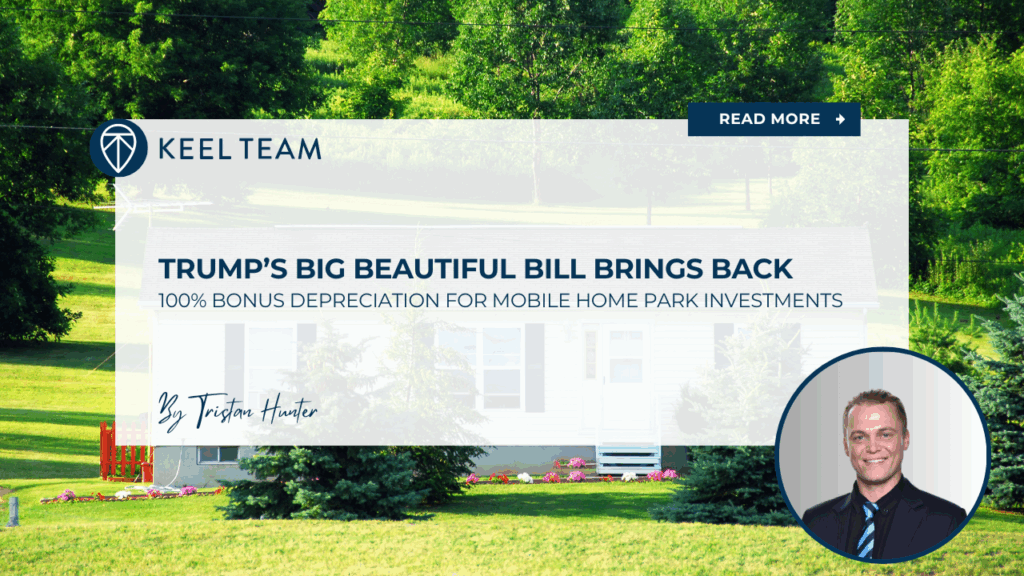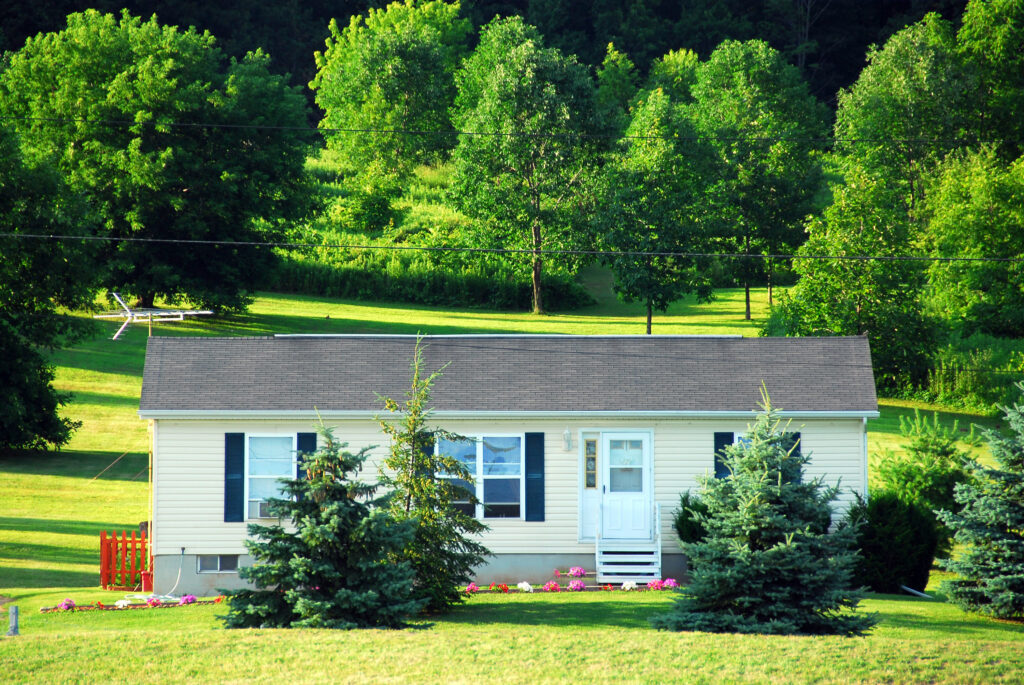Trump’s One Big Beautiful Bill Brings Back 100% Bonus Depreciation for Mobile Home Park Investments
-
 Tristan Hunter - Investor Relations
Tristan Hunter - Investor Relations

The recent signing of a new bill has reinstated 100% bonus depreciation, a game-changer for real estate investors, particularly those eyeing mobile home park investments. This powerful tax strategy can enable investors to accelerate depreciation deductions, potentially reducing their federal tax bills and increasing cash flow in the first year of ownership. For mobile home park investors, the potential benefits are especially compelling due to the unique composition of these properties. Let’s explore what 100% bonus depreciation means, why it can be a boon for mobile home park investments, and how a cost segregation study can help maximize your returns.
What Is 100% Bonus Depreciation?
A Tax Break That Packs a Punch
Under 100% bonus depreciation, investors can deduct the full cost of certain property components in the first year of ownership, rather than spreading deductions over decades. For real estate, this typically applies to assets with a useful life of 20 years or less, such as land improvements, personal property, and certain building components. Instead of waiting 27.5 years to depreciate an apartment building or 39 years for commercial property, you can claim a significant portion upfront.
This provision, reintroduced in 2025, empowers investors to offset taxable income, potentially keeping more cash in their pockets. For mobile home park investors, the opportunity is particularly attractive because these properties often include a high percentage of assets eligible for accelerated depreciation.
Why Mobile Home Park Investments Can Shine
Mobile home parks are unique in that a large portion of their value often lies in land improvements—like roads, utility systems, and site preparations—rather than buildings. These improvements typically have a shorter depreciation lifespan, averaging around 15 years, compared to 27.5 or 39 years for traditional real estate. With 100% bonus depreciation, you can potentially deduct these costs immediately, amplifying your tax savings.
Download our FREE eBook on the Top 20 things to know BEFORE investing in mobile home parks!
Why Invest in Mobile Home Parks with 100% Bonus Depreciation?
Maximize Cash Flow Potential Today
The primary advantage of 100% bonus depreciation is the velocity of money. By claiming a large depreciation deduction upfront, you reduce your taxable income, potentially lowering your federal tax bill. This extra cash can be reinvested into additional mobile home park acquisitions, property upgrades, or other income-generating ventures. Why wait decades for tax savings when you can leverage them now to grow your portfolio?
For example, imagine purchasing a mobile home park for $1 million, with $400,000 allocated to land improvements eligible for bonus depreciation. A cost segregation study could allow you to deduct that $400,000 in year one, potentially offsetting passive income from rents, dividends, or other investments. This could translate to thousands in tax savings, depending on your tax bracket.
Offset Passive and Earned Income
For most investors, depreciation acts as a “paper loss” to offset passive income, such as rental cash flow or stock dividends. This reduces your taxable income, allowing you to keep more of your earnings. However, if you qualify as a Qualified Real Estate Professional (QREP) under IRS guidelines, the benefits are even greater. QREPs can use these paper losses to offset earned income, such as salaries or business profits, potentially leading to substantial tax savings.
To qualify as a QREP, you must spend at least 750 hours per year on real estate activities and more than half your working hours in real estate. If you meet these criteria, 100% bonus depreciation could significantly lower your overall tax liability.
Spur Investment in Mobile Home Parks
The return of 100% bonus depreciation may ignite a surge in mobile home park investments. With the potential for immediate tax savings, investors may be more inclined to acquire or expand their portfolios. Mobile home parks, already a resilient asset class due to their affordability and steady demand, become even more attractive. As housing costs rise, mobile home parks offer a cost-effective solution for tenants, ensuring consistent rental income for investors.
The Power of Cost Segregation Studies
What is a Cost Segregation Study?
A cost segregation study is a detailed analysis that breaks down a property’s components to identify assets eligible for accelerated depreciation. For mobile home parks, this study is critical because it reallocates costs from long-life assets (like buildings) to shorter-life assets (like land improvements or personal property). These shorter-life assets—often depreciated over 5, 7, or 15 years—qualify for 100% bonus depreciation, allowing you to claim deductions upfront.
For instance, a mobile home park might include paved roads, utility hookups, fencing, or landscaping. A cost segregation study could classify these as 15-year land improvements, making them eligible for immediate depreciation. Without a study, you might depreciate the entire property over 27.5 years, missing out on significant tax savings.
Why it’s Essential for Mobile Home Parks
Mobile home parks are particularly well-suited for cost segregation studies because a large portion of their value—often 30–50% or more—lies in land improvements. Unlike traditional apartment buildings, where the building itself dominates the cost basis, mobile home parks have extensive infrastructure that qualifies for faster depreciation. A professional cost segregation study can maximize your deductions, potentially saving tens or hundreds of thousands in taxes in the first year.
Engaging a qualified cost segregation firm ensures compliance with IRS guidelines and provides defensible documentation in case of an audit. While the upfront cost of a study (typically $5,000–$15,000) may seem steep, the tax savings often far outweigh the expense.
Important Considerations and Limitations
State-Specific Rules
While 100% bonus depreciation is a federal tax benefit, not all states recognize it. For example, states like New York may not conform to federal bonus depreciation rules, limiting your ability to use it against state taxes. If you’re in a non-conforming state, you can still apply the deduction to your federal tax bill, but consult a tax professional to understand your state’s rules.
Depreciation Recapture
Bonus depreciation doesn’t eliminate your tax liability—it defers it. When you sell a mobile home park, you may face depreciation recapture, where the IRS taxes the depreciation deductions you claimed at a rate of up to 25%. If you don’t use a 1031 exchange to defer taxes by reinvesting in another property, you’ll owe this amount. Even with a 1031 exchange, the tax liability may eventually come due when you stop exchanging properties.
Despite this, the time value of money makes bonus depreciation attractive. Having cash today allows you to invest and grow your wealth faster than waiting for future deductions.
Consult a Tax Professional
Tax laws are complex, and 100% bonus depreciation involves nuances that vary by individual circumstances. Work with a CPA or tax advisor familiar with real estate and cost segregation to ensure you’re maximizing benefits while staying compliant. They can also help determine if you qualify as a QREP or navigate state-specific rules.

Why Mobile Home Parks Can Be a Smart Investment
High Demand, Low Supply
Mobile home parks cater to a growing demographic seeking affordable housing. With rising home prices, many Americans turn to mobile homes as a cost-effective alternative. Yet, the supply of mobile home parks is limited, as zoning restrictions and development costs deter new construction. This scarcity drives demand, ensuring stable occupancy and rental income.
Recession Resilience
Mobile home parks have proven resilient during economic downturns. Tenants often prioritize affordable housing, making these properties less vulnerable to market fluctuations. The combination of steady cash flow and tax advantages like 100% bonus depreciation makes mobile home parks a compelling investment.
Scalable Opportunities
With the cash flow generated from bonus depreciation, investors can scale their portfolios by acquiring additional mobile home parks or upgrading existing ones. Improvements like better utilities or community amenities can increase property value and rental rates, further boosting returns.
Seize the Opportunity
The reinstatement of 100% bonus depreciation is a golden opportunity for mobile home park investors. By leveraging cost segregation studies, you can unlock significant tax savings, accelerate cash flow, and grow your portfolio faster. While depreciation recapture and state-specific rules require careful planning, the benefits of having cash today far outweigh the drawbacks for savvy investors.
Ready to dive into mobile home park investing? Consult a tax professional, commission a cost segregation study, and explore available properties. With 100% bonus depreciation back in play, there’s no better time to capitalize on this tax-advantaged asset class.
Are you looking for MORE information? Book a 1-on-1 consultation with Andrew Keel to discuss:
- A mobile home park deal review
- Due diligence questions
- How to raise capital from investors
- Mistakes to avoid, and more!
Disclaimer:
The information provided is for informational purposes only and is not investment advice or a guarantee of any kind. We do not guarantee profitability. Make investment decisions based on your research and consult registered financial and legal professionals. We are not registered financial or legal professionals and do not provide personalized investment recommendations.

Tristan Hunter - Investor Relations
View The Previous or Next Post
Subscribe Below 👇





